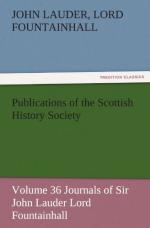be judges in it [the Session], viz., Hatton, Sir Andrew Ramsay,
Mr. Robert Preston, and Pittrichie, he rendered thereby the
Session the object of all men’s contempt. And the Advocates being
disobliged by the regulations did endeavour, as far as in them
lay, to discover to the people the errors of those who had opprest
them: and they being now become numerous, and most of them being
idle, though men of excellent parts, wanting rather clients than
wit and learning, that society became the only distributor of
fame, and in effect the fittest instrument for all alterations:
for such as were eminent, did by their authority, and such as were
idle, by well contrived and witty raillery, make what impressions
they pleased upon the people. Nor did any suffer so much as the
Lord Stairs, President of the Session; who, because of his great
affection to Lauderdale, and his compliance with Hatton, suffered
severely, though formerly he had been admired for his sweet temper
and strong parts. And by him our countrymen may learn, that such
as would be esteemed excellent judges must live abstracted from
the court; and I have heard the President himself assert that no
judge should be either member of Council or Exchequer, for these
courts did learn men to be less exact justiciars than was
requisite.’
[25] See Appendix III.
It is not to be inferred from such strictures on the administration of justice, a matter on which, as an upright lawyer, Lauder was keenly sensitive, that he was an ill-natured critic of his professional brethren or of public men. On the contrary, the tone of his observations, though shrewd and humorous, is kindly and large-minded. He admired Lockhart, who was his senior at the bar, and whom he perhaps regarded more than any other man as his professional leader and chief, though he does not escape a certain amount of genial criticism. His enthusiastic eulogy of Lockhart’s eloquence has been often quoted. In his estimation of Mackenzie it is easy to see, that while he doubted the wisdom and humanity of his relentless prosecutions, and while his arrogance comes in for criticism in a lighter vein, respect for his capacity, learning, and industry was the predominating element. It is pleasant to see the constant interest that he took in Bishop Burnet’s books and movements, though they do not appear ever to have met. ‘Our Dr. Burnet,’ as he calls him. But that only means that he was a Scotsman, for he describes Ferguson the Plotter in the same way. There is nowhere a touch of jealousy or envy in those private journals.




